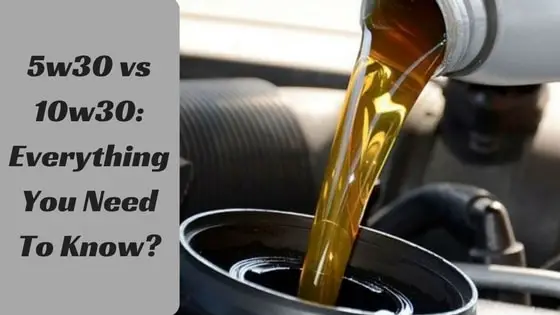5w30 vs 10w30: Everything You Need To Know? What Is An Engine Oil?
Every motor and engines need a lubricant, and the engine oil is basically the lubricant. It protects the moving parts from colliding or rub with each other. Every engine needs oil to work.
Motor Oils Contain:
- Corrosion
- Rust inhibitors to prevent the engine from rusting
Video Overview: How does car engine oil work?
5w30 vs 10w30: Top Engine Oil Facts You Need To Know?
Engine oil is one of the most sensitive substances to temperature variations. Oil being a critical engine requirement, it is worth understanding how it behaves when exposed to different temperature conditions. Different engine oils respond differently to temperature changes. For instance, two distinct oils may not experience a similar decrease in viscosity should their temperatures happen to rise.
Even though there would be a general decrease in oil thickness with an increase in temperature, the change can’t be the same for two different oils. This is where the concept of 5W30 vs. 10W30 engine oil comes in.
The first digits, 5 and 10 in this case, represent the thickness of oil at low temperatures. It is important to note that the smaller the value, is the less viscous the oil is. The opposite is true for higher values.
On the other hand, the second digit which in this case is 30, represents the oil’s viscosity and the operating temperature. Therefore, the thicknesses of the 5W30 and the 10W30 grades would be the same as the operating temperature.
Video Overview: Engine Oil Codes Explained, SAE (Society of Automotive Engineers) numbers explained/Viscosity
Between 5W30 and 10W30: Which One Should You Really Use?
What actually dictates the oil grade to use is never entirely your personal preferences, but the prevailing weather conditions. For example, you need to first ask yourself questions like, is it winter? Or is it Summer?
The 5W30 is most preferred for a winter season. It is more viscous at lower temperatures than the 10W30 type. This will ensure an adequate oil circulation to every part of the engine as required.
For high-temperature conditions as those of summer then a thicker grade is the best way to go. In such a situation, the 10W30 option would remain viscous enough to protect the engine regardless of how hot it could be in the immediate surroundings.
So it means that if you stay in a place which is cool during the months of winter, then having a 5W30 engine oil will work best. On the other hand, the 10W30 oil grade is an ideal choice for areas with hot months of summer.
What about the vehicle’s mileage? Is it important? Yes, it is a very critical factor to consider. For instance, vehicles with high mileages are required to use highly viscous engine oils. Perhaps, something like 15W40 would be recommendable contrary to using 5W30 which could be so low.
Video Overview: Should You Switch to Thicker Oil for Summer? | Gearhead Diva
How the Best Engine Oil Thickness (High Viscosity) is Practically Achieved
It was so unfortunate in the past since one had to look for the best oil option for his or her engine needs. But thanks to research and technology. Nowadays, oils are mixed with additives which make them respond to various temperature variations accordingly. This has really saved users much time because they don’t have to bother themselves selecting the best oil to go for.
Always remember that the performance of your car’s engine relies on how adequately and regularly you conduct maintenance practices. Imagine you could even begin today for one of the most enhanced drives. Know which engine oil to use to avoid unnecessary engine breakdowns.
From the video below you can learn: Choosing the correct engine oil is critical to engine life with Pat Goss from Goss Garage
Related Post: 45 RV Accessory Must-Haves for Your Travel Trailer
